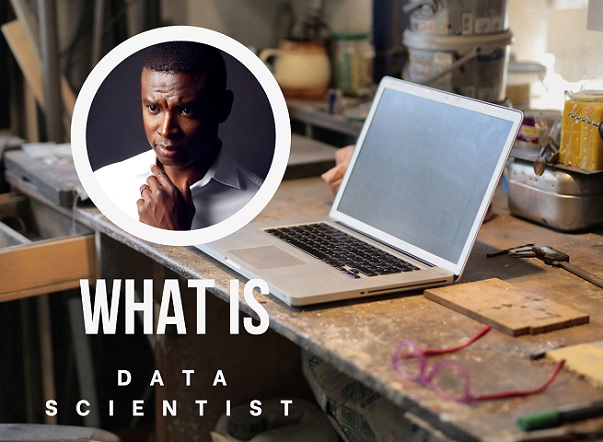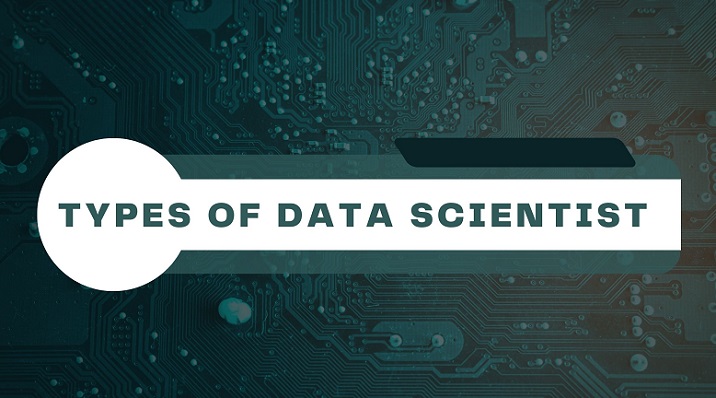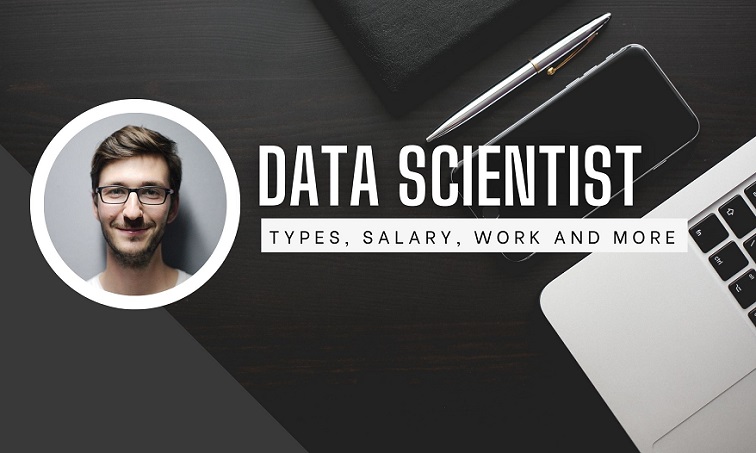Data Scientist – Types, Salary, Work and More in 2024
A data scientist specializes in collecting, processing, analyzing, and interpreting large and complex data sets to extract meaningful insights and make data-driven decisions.
Introduction of Data Scientist
They are often responsible for working with large amounts of structured and unstructured data from various sources, such as customer databases, social media platforms, sensors, and mobile devices.
Data scientists use various analytical and statistical techniques, such as machine learning, data mining, and predictive modeling, to transform raw data into actionable insights.
They also use visualization tools to present their findings in an easily understandable way for stakeholders.

What is Data Scientist?
A data scientist should have strong technical skills, such as proficiency in programming languages like Python or R, and expertise in statistical analysis, database management, and data visualization.
They should also possess excellent communication and problem-solving skills to collaborate with stakeholders, including business analysts, engineers, and executives.
Data scientists can work in various industries, including healthcare, finance, retail, and technology.
Their work can range from identifying patterns in customer behavior to predicting future trends and outcomes, making them a valuable asset for any organization that relies on data-driven decision-making.
In summary, data scientists play a critical role in today’s data-driven world by extracting insights from vast amounts of data to help organizations make better decisions and improve their overall performance.
Types of Data Scientists
There are various types of data scientists, depending on their specific organizational roles and focus. Here are some of the most common types of data scientists:
- Data Analyst: A data analyst analyzes and interprets data to help organizations make data-driven decisions. They typically work with structured data and use tools like Excel, SQL, and visualization software to extract insights from data.
- Machine Learning Engineer: A machine learning engineer focuses on building and implementing machine learning models to predict outcomes and automate processes. They typically have a strong background in computer science and programming.
- Data Engineer: A data engineer is responsible for designing, building, and maintaining the infrastructure required to store and process large amounts of data. They typically have expertise in database management, ETL (Extract, Transform, Load) processes, and distributed computing.
- Business Intelligence Analyst: A business intelligence analyst focuses on analyzing and reporting on business performance data, such as sales figures, customer behavior, and marketing campaigns. They typically use BI tools like Tableau or Power BI to create dashboards and visualizations.
- Data Scientist (Generalist): A generalist data scientist is a versatile professional who can handle various data-related tasks, from data cleaning and preprocessing to building predictive models and presenting insights to stakeholders. They typically have a strong background in statistics.
- Statisticians: These data scientists apply statistical methods to analyze and interpret data, often to make predictions or estimate probabilities.
- Research Scientists: These data scientists focus on developing new algorithms and techniques for analyzing data, often working in academia or industry research labs.
Career in Hospital Administration
How to become a Data Scientist
Data scientists typically require education, practical experience, and technical skills. Here are some steps to becoming a data scientist:
- Education: Pursue a degree in a related field such as computer science, statistics, mathematics, data science, or a related field. Many universities now offer data science programs to prepare students for careers in this field.
- Learn programming languages: Learn programming languages such as Python, R, SQL, and Java. These languages are commonly used in data science.
- Gain experience with data tools and technologies: Familiarize yourself with data tools and technologies such as Hadoop, Spark, TensorFlow, and Tableau.
- Participate in data projects and internships: Participate in data projects and apprenticeships to gain practical experience working with data and solving data-related problems.
- Build a portfolio: Build a portfolio of data projects and analyses that showcase your skills and experience to potential employers.
- Network: Attend industry events, join online communities, and network with other data scientists to learn about job opportunities and stay up-to-date on the latest trends and technologies.
- Keep learning: Continuously learn and stay up-to-date with new tools, technologies, and best practices in data science to remain competitive in the field.
It’s important to note that becoming a data scientist is a journey, and there’s no one-size-fits-all path to success. Different people may take different ways to achieve their goals, and it may take some trial and error to find what works best for you.
What is the salary of a Data Scientist in India?
The salary of a data scientist in India can vary based on factors such as location, years of experience, education level, and the company they work for.
According to Payscale, the average salary for a data scientist in India is around Rs 799,000 annually. However, this can range from around Rs 310,000 to over Rs 2,000,000 annually, depending on the above factors.
In addition, data scientists with specialized skills such as machine learning, artificial intelligence, or big data analytics may command higher salaries.
Data Scientist Specialist
A Data Scientist specialist is a data scientist with expertise in a specific area or field of data science. Data science is a broad field with many different specializations, such as machine learning, natural language processing, computer vision, data engineering, and more.
A Data Scientist specialist typically has in-depth knowledge of the tools, techniques, and algorithms used in their area of specialization. They may deeply understand a specific industry or domain, such as healthcare, finance, or e-commerce.
Data Scientist specialists are often sought after by companies that need someone with specific skills and experience to tackle a particular data problem or project.
For example, a company building a recommendation engine may need a Data Scientist specialist in machine learning to design and implement the algorithm.
Becoming a Data Scientist specialist typically requires a combination of education, practical experience, and continuous learning.
In addition to having a solid foundation in data science, a Data Scientist specialist must also have a deep understanding of the specific area they specialize in and the tools and techniques used in that field.
FAQ
What qualifications do I need to be a data scientist?
The qualifications required to become a data scientist can vary depending on the job and industry. However, here are some familiar qualifications that are typically required or preferred by employers:
- Education: A bachelor’s degree in a related field such as computer science, statistics, mathematics, data science, or a related field is typically required. Many employers prefer candidates with a master’s degree or Ph.D. in a related field.
- Technical skills: Strong programming skills in Python, R, SQL, and Java are often required. Knowledge of data tools and technologies such as Hadoop, Spark, TensorFlow, and Tableau is also valuable.
- Analytical skills: Data scientists need to be able to analyze large amounts of data and draw insights from it. Strong analytical skills, including statistical analysis and data visualization, are essential.
- Business acumen: Data scientists need to be able to understand and communicate the business implications of their findings. Therefore, having business acumen and a good understanding of the industry or domain they work in is valuable.
- Communication skills: Data scientists must communicate complex data concepts and findings to non-technical stakeholders. Therefore, strong communication skills, including written and verbal communication, are essential.
- Experience: Experience working with data, either through internships, projects, or previous work experience, is valuable.
It’s important to note that data science is a rapidly evolving field, and continuous learning is required to stay up-to-date with new tools, technologies, and best practices. Therefore, a willingness to learn and adapt is also an essential qualification for a data scientist.
Is data science a promising career?
Yes, a data scientist is a great career option. A data scientist’s role involves the following:
- Analyzing large and complex data sets to uncover insights and patterns.
- Developing predictive models.
- Communicating findings to stakeholders.
The demand for data scientists has been increasing rapidly in recent years due to the growing importance of data-driven decision-making in various industries.
Data scientists typically have a vital statistics, mathematics, and computer science background and often hold advanced degrees. They also possess strong programming skills and are proficient in programming languages like Python and R.
According to Glassdoor, the average salary for a data scientist in the United States is over $113,000 per year, with many opportunities for career advancement and growth.
Additionally, data science is a field that offers a great deal of flexibility in terms of the industries and areas of focus in that data scientists can specialize.
Data science is a rewarding and challenging career with excellent potential for personal and professional growth.
Is it hard to become a data scientist?
Becoming a data scientist requires a combination of skills, knowledge, and experience, which can make it challenging to enter the field. However, it is possible to become a data scientist with dedication and effort.
To become a data scientist, you must have a strong mathematics, statistics, and computer science foundation.
This can be achieved through formal education, such as earning a degree in a related field, or through self-study and online resources.
In addition to a strong foundation in technical skills, data scientists must have excellent problem-solving skills, communication skills, and an ability to work with diverse stakeholders.
Gaining experience through internships, projects, or working with open-source data sets can help develop these skills and provide practical knowledge.
One of the best ways to become a data scientist is to gain hands-on experience working on real-world data science projects.
This can be accomplished through participation in online communities, Kaggle competitions, or contributing to open-source projects.
While becoming a data scientist can be challenging, it is an exciting and rewarding career that offers many opportunities for growth and development. With persistence, dedication, and a willingness to learn, entering and succeeding in this field is possible.

Is data science math heavy?
Yes, data science is a math-heavy field. Mathematics is an essential component of data science, as it provides the foundational knowledge needed to work with data, build models, and draw insights. A data scientist should understand statistics, linear algebra, calculus, and probability theory.
Statistics, for instance, is crucial for understanding and summarizing large amounts of data and for building predictive models. Linear algebra is necessary for working with matrices and vectors, commonly used in data science. Calculus is essential for optimization algorithms used to train machine learning models. Probability theory is used to model uncertainty and make decisions based on probabilities.
Moreover, data scientists should have programming skills to apply mathematical concepts practically. Programming languages such as Python, R, and SQL are commonly used in data science, and proficiency in these languages is crucial for manipulating data, building models, and communicating findings.
In summary, while data science requires more than just math skills, mathematics is a critical field component. A strong understanding of mathematics is essential for developing insights from data and building accurate predictive models.
Does a data scientist do coding?
Yes, data scientists do coding. Coding is a crucial skill for data scientists. It allows them to manipulate, analyze, and visualize large datasets, build machine learning models, and develop algorithms that can draw insights and predictions from data.
Data scientists commonly use programming languages like Python, R, and SQL to manipulate data and build models.
They also use other tools like Jupyter notebooks, Git, and various libraries and frameworks to analyze data, build models, and communicate findings.
Data scientists may also work with other data-related tools, such as databases, data visualization software, and big data technologies like Hadoop and Spark. They use these tools to extract, transform, and load data and store and retrieve it efficiently.
In summary, coding is an essential skill for data scientists. They use coding to manipulate data, build models, and communicate findings. The ability to code and work with data is a fundamental requirement for a career as a data scientist.
Can I learn data science in 3 months?
Learning data science in just three months is challenging, but it is not impossible. However, the extent to which you can learn data science in 3 months depends on your prior knowledge and experience in related fields.
If you have a mathematics, statistics, and computer science background, you can learn the fundamentals of data science within three months.
This would involve learning programming languages such as Python or R, mastering statistics and probability theory, and getting hands-on experience with data analysis and modeling tools.
On the other hand, if you have a strong foundation in these areas, acquiring the necessary knowledge and skills may take up to three months to become a proficient data scientist.
Several online courses, boot camps, and resources can help you learn data science in a condensed timeframe.
However, it is essential to note that mastering data science requires ongoing learning and practice. Therefore, while three months is a good starting point, you should continue to learn and practice data science throughout your career.
In summary, while learning data science in 3 months is possible, the extent to which you can know the field depends on your prior knowledge and experience. Teaching data science requires ongoing learning and practice, a lifelong process.
Which language is best for data science?
Python is currently the most popular language for data science. It has a vast ecosystem of libraries and tools for data analysis, machine learning, and scientific computing, such as NumPy, Pandas, Scikit-learn, TensorFlow, and PyTorch.
Python is also easy to learn, has clear syntax, and is highly readable, making it a favorite among data scientists.
R is another popular language for data science, particularly in statistics. It has a powerful suite of tools for data analysis, visualization, and modeling, such as the tidyverse packages. R is also highly extensible and can be used for various data-related tasks.
SQL is also an essential language for data science, particularly for working with databases and managing large datasets. SQL is commonly used for data cleaning, manipulation, and transformation tasks.
Python is the most popular language for data science, but R and SQL are also essential for specific tasks. Ultimately, the choice of language depends on the particular needs of the project or task at hand.
Is Python enough for data science?
Yes, Python is enough for data science. Python is currently the most popular language for data science. It has a vast ecosystem of libraries and tools that can be used for data analysis, machine learning, and scientific computing.
Python has powerful libraries like NumPy and Pandas for numerical computations and data manipulation, Matplotlib and Seaborn for data visualization, Scikit-learn for machine learning, and TensorFlow and PyTorch for deep understanding.
These libraries make it possible to perform complex data analysis tasks and build predictive models with ease.
In addition, Python is easy to learn, has clear syntax, and is highly readable, making it a favorite among data scientists. Python is also a general-purpose language, meaning it can be used for other tasks outside data science, such as web development and automation.
However, while Python is enough for data science, it is essential to note that data science requires more than just programming skills. A data scientist must also have a strong understanding of mathematics, statistics, and data analysis techniques to draw insights and make accurate predictions from data. They must also have good communication and problem-solving skills to communicate their findings and insights to stakeholders effectively.
Python is enough for data science, but it is just one of many tools and skills required to be a proficient data scientist.
Career in Marketing Management
What is the syllabus of data science?
The syllabus for data science can vary depending on the course or program, but generally, it covers the following topics:
- Mathematics and Statistics: Linear Algebra, Calculus, Probability Theory, and Statistics
- Programming Languages: Python, R, SQL, and sometimes MATLAB
- Data Manipulation and Analysis: Data Cleaning, Data Preprocessing, Data Wrangling, and Exploratory Data Analysis (EDA)
- Data Visualization: Basic and Advanced Graphical Representation of Data
- Machine Learning: Supervised Learning, Unsupervised Learning, Semi-Supervised Learning, and Deep Learning
- Big Data Tools and Technologies: Hadoop, Spark, and NoSQL Databases
- Data Storytelling: Communicating Insights and Findings to Non-technical Audiences
- Real-World Applications: Case Studies and Project Work
In addition, some courses or programs may also cover specialized topics like Natural Language Processing (NLP), Computer Vision, and Time Series Analysis.
It is important to note that the syllabus for data science is constantly evolving, and new topics and techniques are continually being added as the field advances. Therefore, data scientists must have a growth mindset and continuously update their skills and knowledge.
Which skill is best for data science?
Data science requires a combination of technical and non-technical skills to be successful. Some of the essential skills for data science are:
Programming: Strong programming skills in languages like Python or R are essential for data science. Data scientists should be able to write efficient and scalable code to manipulate, process, and analyze large datasets.
Mathematics and Statistics: Data science involves working with mathematical and statistical concepts like linear algebra, calculus, probability theory, and statistics. A solid understanding of these concepts is necessary to create accurate models and make data-driven decisions.
Data Manipulation and Analysis: Data scientists must be skilled in manipulating and analyzing data using tools like NumPy, Pandas, and SQL. This involves cleaning, preprocessing, wrangling, and performing exploratory data analysis to derive insights from data.
Machine Learning: Machine learning is a crucial skill for data scientists. They should be proficient in a range of machine learning algorithms, both supervised and unsupervised, and know when and how to apply them to real-world problems.
Data Visualization: Data scientists must be able to create meaningful visualizations of data to communicate insights and findings to stakeholders. Visualization tools like Matplotlib and Tableau are commonly used.
Communication: Data scientists should have strong communication skills to convey complex concepts to non-technical stakeholders effectively. This includes writing clear reports, giving presentations, and explaining findings in plain language.
Problem-Solving: Data scientists should be able to identify problems and formulate solutions using a structured and analytical approach. This involves identifying the correct data, selecting appropriate tools and techniques, and evaluating the results.
In summary, the best skills for data science include programming, mathematics and statistics, data manipulation and analysis, machine learning, data visualization, communication, and problem-solving. A good data scientist should possess a combination of these skills and be able to continuously update their skills to keep up with the rapidly evolving field.
Is data science more math or CS?
Data science is an interdisciplinary field that requires skills from both mathematics and computer science (CS). Both areas are essential for data science, but the relative emphasis on each can vary depending on the specific task or project.
Mathematics plays a significant role in data science, providing the foundations for statistical inference, machine learning, and other data analysis techniques.
Linear algebra, calculus, probability theory, and statistics are all mathematical concepts used extensively in data science.
A strong understanding of mathematics is essential for a data scientist to create accurate models and make data-driven decisions.
On the other hand, computer science skills are also essential for data science, as data scientists must be able to work with and manipulate large datasets efficiently.
Programming languages like Python and R are commonly used for data manipulation and analysis, while knowledge of databases and SQL is crucial for working with large amounts of data.
Additionally, knowledge of algorithms, data structures, and software engineering principles is essential for building scalable and efficient data processing pipelines.
In summary, data science requires combining mathematical and computer science skills. A good data scientist should be comfortable with both areas and be able to use them in concert to solve real-world problems.
Investment Banker | Chartered Accountant | IT Manager | Dentist | Software Architect | Orthodontist | Psychiatrist | Physician | Surgeon





